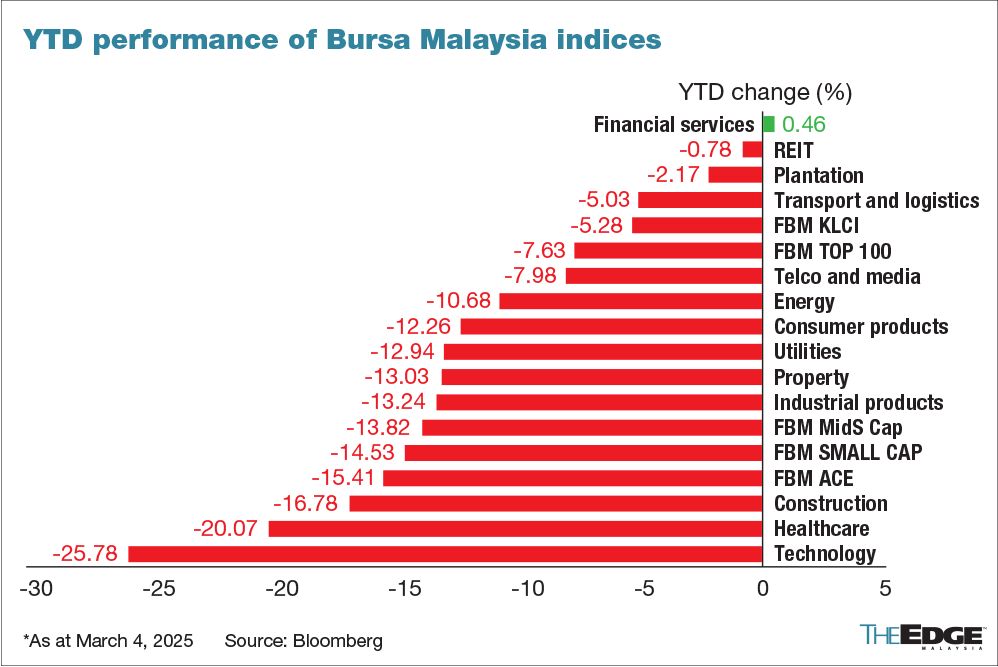
KUALA LUMPUR (March 4): About two-thirds or over 1,000 counters on the local bourse closed in the red on Tuesday, as persistent foreign outflows and escalating global uncertainties drove investor sentiment further south.
The FBM KLCI ended 15.73 points or 1% lower to hit a one-month low of 1,555.66 points, with 23 of the 30 component stocks ending lower. All sectoral indices ended lower, with the technology sector hit the hardest, falling 4.36%, followed by property (-3.21%) and construction (-3.12%).
Losers far outpaced gainers, with a stark 1,045 to 147 split, while 331 counters held steady, reflecting the negative sentiment in the market. Total market volume was 3.84 billion shares, valued at RM3.05 billion.
Among KLCI constituents, top losers were Nestle (Malaysia) Bhd (KL:NESTLE), which tumbled RM1 to RM79.12, followed by PPB Group Bhd (KL:PPB), which declined 34 sen to RM10.76, while Petronas Dagangan Bhd (KL:PETDAG) lost 24 sen to RM18.46.
On the broader market, Malaysian Pacific Industries Bhd (KL:MPI) fell RM1.62 to RM17.04, Dutch Lady Milk Industries Bhd (KL:DLADY) declined 90 sen to RM27.60, and Fraser & Neave Holdings Bhd (KL:F&N) lost 58 sen to RM25.04.
Rakuten Trade head of equity sales Vincent Lau said the market’s decline has been part of a longer-term trend, exacerbated by sustained foreign fund outflows.
“Our market has been on this trend for some time. Foreign outflow last week was RM1.27 billion, and yesterday it was around RM66 million or something. Year-to-date, it's easily about RM5.4 billion already. This two-month outflow is more than the cumulative figure for last year,” he told The Edge.
Lau added that the prolonged sell-off is largely driven by external factors, including geopolitical tensions and global policy shifts.
“Of course, it's the global uncertainties — Trump threatening to pull out of Nato, the war in Ukraine, tariffs on China and Mexico. Every other day there seems to be some shocking news causing the market to spiral down,” he said.
MIDF Amanah Investment Bank Bhd’s head of research Imran Yassin Md Yusof concurred, noting that the market’s movement mirrored global trends.
“The market mirrored the decline seen on Wall Street due to heightened trade tensions following the US confirmation of tariffs on Mexico, Canada and China. This follows regional performance as well,” Imran said.
He added that while foreign outflows add pressure to the market, the impact varies across sectors.
“It (the persistent foreign outflow) certainly adds pressure to the market, especially for this year. But it depends on the sectors, as the net selling by foreign funds has not been broad-based, meaning there are still some sectors that are seeing interest from foreigners,” he explained.
According to MIDF's fund flow report for the week ended February 28, foreign investors extended their selling streak on Bursa Malaysia for the 19th consecutive week, with a significantly larger net outflow of RM1.27 billion, compared with RM562.0 million the previous week.
The only sectors that saw net foreign inflows were construction (RM24.1 million), telecommunications and media (RM14.7 million), and real estate investment trusts (RM6.7 million).
Meanwhile, the top three sectors with the highest net foreign outflows were financial services (RM362.1 million), consumer products and services (RM314.9 million), and utilities (RM255.1 million).
Tech stocks hardest hit as persistent foreign selling, global uncertainties weigh on sentiment
Lau noted that technology stocks and small- to mid-cap counters have borne the brunt of the sell-off, with some trading at prices reminiscent of the Covid-19 crash.
“Some tech stocks are at Covid price levels, even though we are not in lockdown. The Nvidia chip ban caused stocks like NationGate Holdings Bhd (KL:NATGATE) to hit limit down, although it rebounded today because the issue wasn't directly related to them,” he explained.
Despite the steep declines, Lau sees potential buying opportunities for investors with higher risk tolerance.
“There are bargains out there, but also a lot of uncertainties. People are worried, they want to hold cash and wait for things to unfold more clearly,” he added.
While much of the market has been battered, banking and index-linked stocks have held up relatively well. “I think the banks are doing perfectly okay and index-linked stocks are still stable,” Lau added.
The Financial Services Index on Bursa saw a relatively modest drop of 0.65% on Tuesday.
- Thirteen stocks see short-selling suspension amid market sell-off
- Market plunge drags FBM KLCI down over 5%, as East Asian markets sink on trade war concerns
- China has already trade-war-proofed its economy
- Stocks plunge on tariff turmoil, markets bet on rapid US rate cuts
- US reciprocal tariffs to negatively impact CPO prices, may prompt earnings cut — CIMB Securities
- Govt to mount multi-level response to US tariffs, says Zafrul
- Stocks plunge on tariff turmoil, markets bet on rapid US rate cuts
- Nga to meet PM to discuss best formula to help Putra Heights fire victims
- Gas pipeline fire victims to receive additional financial aid from Petronas, says Amirudin
- Asian emerging market stocks set for worst day in 16 years

